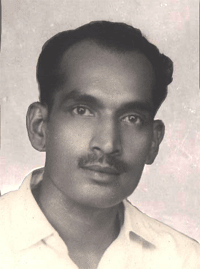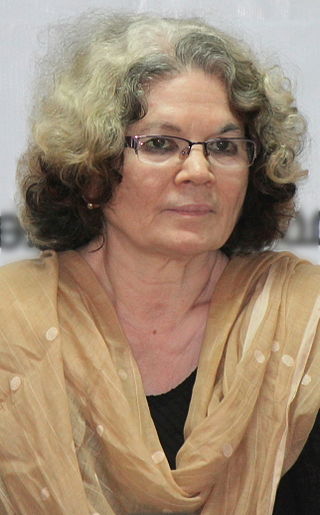
Panikkassery Keshavan "P.K." Balakrishnan was an Indian novelist and critic. A doyen of Malayalam literature, he is best known for his novel, Ini Njan Urangatte, a novel based on Mahabharata as well as a number of critical studies which include Chandu Menon Oru Padanam, Novel Siddhiyum Sadhanayum, Kavyakala Kumaranasaniloode, and Ezhuthachante Kala: Chila Vyasabharatha Patanangalum. His Jathivyavasthayum Kerala Charitravum is a work in social history.

Ottupulackal Velukkuty Vijayan, commonly known as O. V. Vijayan, was an Indian author and cartoonist, who was an important figure in modern Malayalam language literature. Best known for his first novel Khasakkinte Itihasam (1969), Vijayan was the author of six novels, nine short-story collections, and nine collections of essays, memoirs and reflections.

Kizhakke Marathu Kuttikrishna Marar was an Indian essayist and literary critic of Malayalam literature. He was known for Bharathaparyaadanam, a critical study of the Mahabharata, which is counted by many among the most influential books in Malayalam and was a recipient of the Sahitya Akademi Award and Kerala Sahitya Akademi Award.

Vyloppilli Sreedhara Menon was an Indian poet of Malayalam literature. Known for his works such as Kudiyozhikkal, Kannikkoythu and Mambazham, Menon was the founder president of the Purogamana Kala Sahitya Sangham, an organisation of Kerala-based artists, writers and art and literature enthusiasts. He was a recipient of several honours including Sahitya Akademi Award, Kerala Sahitya Akademi Award for Poetry, Vayalar Award and Odakkuzhal Award.

Kunjunni, popularly known as Kunjunni Mash, was an Indian poet of Malayalam literature. Known for his short poems with a philosophical overtone, his works were popular among children as well as adults. He received several honors including three awards from the Kerala Sahitya Akademi viz. Kerala Sahitya Akademi Award for Children's Literature, Kerala Sahitya Akademi Award for Poetry and Kerala Sahitya Akademi Award for Overall Contributions.
Moorkkanaat Krishnankutty Menon, better known by his pen name Vilasini, was an Indian writer from Kerala who wrote in Malayalam-language. He is the author of India's longest novel, Avakasikal, for which he won the Kendra Sahitya Akademi Award in 1981 and Vayalar Award in 1983. His first novel Niramulla Nizhalukal won the Kerala Sahitya Akademi Award in 1966.
P. Kunjanandan Nair, better known by his pseudonym, Thikkodiyan, was an Indian playwright, novelist, lyricist and screenwriter of Malayalam. He was known for his contributions to the genre of radio plays and his autobiography, Arangu Kaanatha Nadan, which detailed the socio-cultural development of Malabar in the post-independent period, fetched him a number of awards including the Kendra Sahithya Academy Award, Kerala Sahitya Akademi Award for Biography and Autobiography, Vayalar Award and the Odakkuzhal Award.
N. P. Mohammed, popularly known by his initials N. P., was an Indian novelist, short story writer and screenwriter of Malayalam language. Along with his contemporaries like M. T. Vasudevan Nair, O. V. Vijayan, Kakkanadan, and Madhavikutty, he was known to have been one of the pioneers of modernist movement in Malayalam fiction. He was the president of Kerala Sahitya Akademi and a recipient of several awards including Kendra Sahitya Akademi Award, Kerala Sahitya Akademi Award for Story, Kerala Sahitya Akademi Award for Novel, Lalithambika Antharjanam Award, Padmaprabha Literary Award and the Muttathu Varkey Award.

Subhash Chandran is a Malayalam novelist, short story writer and journalist from Kerala, India. His work includes the 2010 novel Manushyanu Oru Aamukham and the stories "Vadhakramam", "Sanmargam", "Parudeesa Nashtam" and "Guptham", which have been adapted into films. Chandran is the only writer to receive Kerala Sahitya Akademi Awards for both his debut story collection (2001) and debut novel (2011).

Sarah Joseph is an Indian novelist and short story writer in Malayalam. She won the Kendra Sahitya Akademi Award and the Vayalar Award for her novel Aalahayude Penmakkal. She is a leader of the feminist movement in Kerala and is the founder of the activist organization Manushi. She joined the Aam Aadmi Party in 2014 and contested the 2014 parliament elections from Thrissur Lok Sabha constituency.

K. R. Meera is an Indian author and journalist, who writes in Malayalam. She was born in Sasthamkotta, Kollam district in Kerala. She worked as a journalist in Malayala Manorama but later resigned to concentrate more on writing. She started writing fiction in 2001 and her first short story collection Ormayude Njarambu was published in 2002. Since then she has published five collections of short stories, two novellas, five novels and two children's books. She won the Kerala Sahitya Akademi Award in 2009 for her short-story, Ave Maria. Her novel Aarachaar (2012) is widely regarded as one of the best literary works produced in Malayalam language. It received several awards including the Kerala Sahitya Akademi Award (2013), Odakkuzhal Award (2013), Vayalar Award (2014) and Kendra Sahitya Akademi Award (2015). It was also shortlisted for the 2016 DSC Prize for South Asian Literature.

K. Surendran was an Indian novelist who wrote in Malayalam. He won the Kerala Sahitya Akademi Award in 1963 for the novel Maya and the Vayalar Award in 1994 for the novel Guru.

Sippy Pallippuram is an Indian writer of children's literature in Malayalam who has won several awards including Kendra Sahitya Akademi Award and Kerala Sahitya Akademi Award. His novel about the memories of Kunjunni Mash Oridathoru Kunjunni won the national award for children's literature by Kendra Sahitya Akademi. His book Unnikalkku Noottiyettu Gurudeva Kathakal received the Kerala Sahitya Akademi Award for Children's Literature in 2013. A teacher by profession, he has over 80 poetries and stories to his credit in the children's category of Malayalam literature. Sippy has been into children's literature for more than four decades.

A. Sethumadhavan, popularly known as Sethu, is a Malayalam fiction writer. He has published more than 35 books. He won the Kendra Sahitya Akademi Award in 2007 for the work Adayalangal. He received the Kerala Sahitya Akademi Awards in 1982 and 1978 for his works Pandavapuram and Pediswapnangal; and Vayalar Award for Adyalangal in 2006. He also won Odakkuzhal award for his novel Marupiravi. Sethu's other literary works include Velutha Koodarangal, Thaliyola, Kiratham, Niyogam, Sethuvinte Kathakal and Kaimudrakal. He also served as the chairman and CEO of the South Indian Bank. In 2022, he won the Ezhuthachan Puraskaram, highest literary honour of the Kerala Sahitya Akademi.

N. Krishna Pillai was an Indian dramatist, literary critic, translator and historian of Malayalam language. Known for his realism and dramatic portrayal of psycho-social tensions, Pillai's plays earned him the moniker, Kerala Ibsen. He was a recipient of the Sahitya Akademi Award, Kerala Sahitya Akademi Award for Drama, Odakkuzhal Award, Vayalar Award and Kerala Sangeetha Nataka Akademi Award, besides other honours. The Kerala Sahitya Akademi inducted him as a distinguished fellow in 1979.

K. P. Ramanunni (Malayalam:കെ.പി.രാമനുണ്ണി) is a novelist and short-story writer from Kerala, India. His first novel Sufi Paranja Katha won the Kerala Sahitya Akademi Award in 1995 and the novel Daivathinte Pusthakam won the Kendra Sahitya Akademi Award in 2017. Jeevithathinte Pusthakam won the 2011 Vayalar Award.

Agnisakshi is a Malayalam novel written by Lalithambika Antharjanam. Originally serialised in Mathrubhumi Illustrated Weekly, it was published as a book by Current Books in 1976. It tells the story of a Nambudiri woman, who is drawn into the struggle for social and political emancipation but cannot easily shake off the chains of tradition that bind her. The novel was concerned with implied criticism of aspects of social structure and behaviour.

Aarachaar is a Malayalam novel written by K. R. Meera. Originally serialised in Madhyamam Weekly in continuous 53 volumes, the novel was published as a book by DC Books in 2012. It was translated by J. Devika into English under the title Hangwoman: Everyone Loves a Good Hanging.

Manushyanu Oru Aamukham is a Malayalam debut novel by Subhash Chandran. The novel is set in Thachanakkara, a fictitious village in central Kerala, India, and has the central character named Jithendran. It was originally serialised in Mathrubhumi Weekly in 2009 and was published as a book by DC Books in 2010. The novel won the Kendra Sahitya Akademi Award (2014), Kerala Sahitya Akademi Award (2011), Odakkuzhal Award (2011), FOKANA Award (2012), Bhasha Institute's Basheer Puraskaaram (2012), Kovilan Puraskaaram (2012) and Vayalar Award (2015).

Ini Njan Urangatte is a Malayalam-language novel written by P. K. Balakrishnan in 1973. The novel's inspiration is the Sanskrit epic Mahabharata. It may be regarded as a historically notable Malayalam-language novel as it has become a yardstick for epic Malayalam fiction, spawning many Mahabharata based-novels.

















